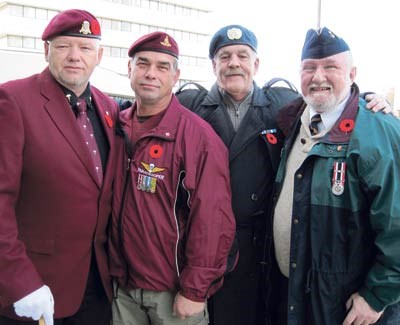Local veterans Randall Hill, Noël Dupuis, Peter McIntyre and Bill Lee said they, and many more veterans of the Canadian Services, have not received fair treatment after they finished participating in military service.
They held a day of protest at Tom Davies Square where representatives gave speeches, sang O Canada, unveiled a banner and launched a petition to seek redress for their pension and other entitlement issues.

Local veterans Randall Hill, Noël Dupuis, Peter McIntyre and Bill Lee attended a national day of protest event at Tom Davies Square Nov. 6. They said they and others have not been served well by Veterans Affairs Canada after they left the military. Photo by Bill Bradley
Hill and Dupuis both served in Cyprus in 1984 and in the airborne division of Canadian Forces in 1985.
Hill was with the airborne battleground special services force.
“Through a workplace injury (after release from the military) I was informed I had a previous injury, a fractured disc in my spine, that was traced back to my military service,” he said. “I was not informed of it.”
He said he did receive a partial pension for his disability after a number of years of fighting for it with the assistance of his doctor.
He said he had to get a written statement from his previous commanding officer, who witnessed Hill being knocked unconscious and suffering injury while in training.
The officer provided a written statement to Veterans Affairs which landed Hill his pension, he said.
He also found out he suffered from post traumatic stress disorder (PTSD). He said he was refused support on three separate occasions by the military, though they agreed he had the symptoms.
“They did not agree I obtained it from my military service,” he said. Since then he has gone to the military’s operational stress clinic in Ottawa.
“It was determined by their doctor that my PTSD was a result of my military service. I am still appealing.”
He said there were a number of incidents that led to his PTSD. For example, seeing first-hand life threatening and career-ending injuries, even while undergoing training exercises, caused him severe stress. PTSD has affected his ability to sleep well. “I have nightmares still.”

The government portrays to the public that all is well with the vets.
Colin Pick,
national president, War Pensioners of Canada
Dupuis, an airborne gunner special service force member, said he has a problem with a chronic disease he contracted while in the military. Upon release he was not informed of his ailiment until it become obvious 12 years later.
“I phoned Veterans Affairs Canada,”he said. “They went through my medical records and they informed me that I had it before I got out. They did not tell me. They released me with this disease that could possibly kill me. If I had not found out I could be dead right now.”
McIntyre, 66, served in Cyprus from 1965 to 1966.
“I was one of the luckier ones,” he said. “I was there before peacekeepers started getting killed.”
Though he did not get injured, his hearing was affected by the noise in the field of operations from small arms to artillery. “Both ears are affected,” he said. “My left ear is burnt out. There was no ear protection given to us in those days.”
He said he is applying for a pension to compensate for his loss of hearing.
Lee, 60, is president of the Sudbury branch of the War Pensioners of Canada. He was a navy diver, serving between 1968 and 1975. He suffered eye ailments and was ordered to see a miltary eye doctor in a military hospital. He said he was misdiagnosed, and suffered complications that led to a severe loss of vision. To this day, he has recieved no support from the navy, he said.
Colin Pick, national president of the War Pensioners of Canada, said he and others are trying to alert Canadians to the plight of many veterans. “The public are not aware that veterans are still greatly in need,” he said. “The government portrays to the public that all is well with the vets.”
He said while Veterans Affairs Canada has a number of services for veterans, access to those services by veterans is a problem.
Sudbury MP Glenn Thibeault said many veterans have come to his constituency office for help. He said Veterans Affairs has become “the insurance company of denial for veterans.”
“It is deny, deny, deny — they hope people will give up and take the small pension they will get,” he said. “Veterans should not have to fight to get the pensions they so rightly deserve, especially when they have been injured or wounded serving their country.”
